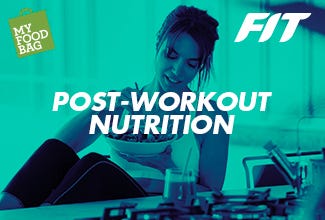
As we exercise, damage to muscle cells is inevitable, in fact it’s the breaking down of muscle cells that we’re trying to achieve with strength-based workouts and it’s the rebuilding and repair of these muscle cells that makes them stronger. To repair and rebuild our muscle cells after this exercise, they require sufficient protein. Our body can do some of the protein synthesis on its own, but to ensure our muscle breakdown doesn’t exceed our rate of muscle tissue synthesis (which will result in loss of muscle mass), we must provide the body with additional protein through our diet (1).
Protein can be from both animal products, such as meat, eggs and dairy, as well as plant based proteins from foods including legumes like chickpeas or lentils, tofu, nuts, seeds and whole grains. When we’re eating a varied diet that includes plenty of these nutritious ingredients, we’ll be sure to be eating a good amount of protein. Consuming protein from the foods we eat is the best way to obtain our dietary protein. If we can’t get enough protein into our meals and snacks, we can look to supplement with a protein powder added to our smoothies or enjoyed just with water (we’ll talk more about protein powders next week!).
It’s also important to replenish depleted glycogen stores in our muscles post exercise with some fast release carbohydrates (high GI — think fruit, milk or yoghurt) to ensure they can start the rebuilding process quickly. Normally, we recommend eating low GI carbohydrates (such as wholegrains or legumes) to reduce the effects of an insulin spike, however after exercise, your muscle cells will readily uptake the glucose, so you can pair both high and low GI carbohydrates in your post workout snack or meal. Including some healthy fats will also provide a slow release energy to help us get through the remainder of our day. Stick to eating whole foods and think of these as the premium fuels — fruits, veggies, eggs, dairy, nuts and seeds and whole grains, rather than sugary energy drinks and highly processed snack bars.
Recovering well, and feeling great after working out drives our motivation to continue to challenge ourselves and make more changes the following week.
1. Phys Sportsmed (2009). Protein for exercise and recovery.Kreider R., Campbell B. Jun;37(2):13–21.


